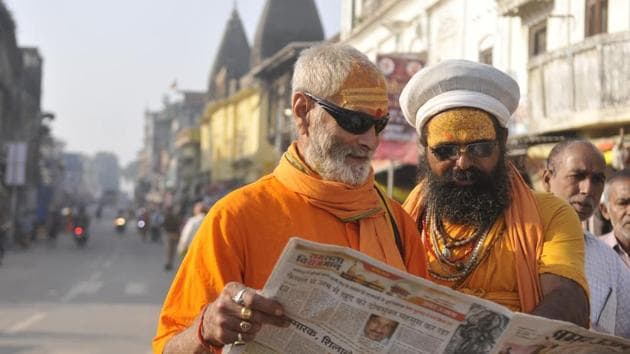How SC’s Ayodhya judgment could affect the course of Indian politics | Opinion
Given that the BJP is having difficulties on the economic front, and many opposition parties (who have relied on the Muslim voters) are facing challenges of their own making, this judgment may be miscued to rally supporters.
My first memory of a curfew is around the time of the Babri Masjid’s demolition in 1992. I was born and spent the first decade of my life in a small village 40 km east of Ayodhya. While my village remained calm during this period, the neighbouring town, where I attended school, was tense and witnessed a few incidents of communal friction. I later learned, as a student of political science, that Hindu-Muslim conflict in India is primarily an urban phenomenon.

The mobilisation for the construction of a Ram Temple at the disputed site in the second half of the 1980s, the subsequent demolition of the Babri Masjid, and the rise of the Bharatiya Janata Party (BJP) in the aftermath made Ayodhya the primary symbol of the Hindu-Muslim meta narrative of Indian politics. How will Saturday’s Supreme Court judgment affect the course of Indian politics?
First, by rejecting the claims of the Nirmohi Akhara over the disputed site, the judgment has unintentionally consolidated the position of the Rashtriya Swayamsevak Sangh (RSS) and its affiliate, the Vishwa Hindu Parishad (VHP) within the Hindu right. In popular perception, as well as in many academic analyses, all Hindu right groups and their political aspirations get lumped into one. This had been a mistake as emerging research suggests the multiplicity of strands within the Hindu right. The Nirmohi Akhara, which was the original plaintiff in this case, and was awarded one-third of the disputed land by the Allahabad high court in 2010, was not on the same page with RSS and VHP on many matters, including the Ram Temple mobilisation in the 1980s.
The VHP made concerted efforts since then to become a party in the dispute through “friends” of Ram Lalla Virajman, who represented the infant deity in the court.
The homogenisation of the Hindu right in conjunction with a BJP-led dominant party system is likely to provide greater momentum to RSS’s ideological world view.
Second, while there is some truth to the claim that the Ayodhya issue has very limited electoral potential, the indications from public opinion data on this issue warn us from overlooking the possibility of religious polarisation. The Lokniti-CSDS, in its surveys since 1996, have regularly asked respondents on what, according to them, should be built on the site of the demolished mosque. In the 1996 survey, a little more than half of the Hindu respondents said that only a temple should be built at the disputed site, while almost an equal proportion of Muslims said only a mosque should be built there.
Support from both communities for their respective places of worship largely remained unchanged for the first half of the 2000s. After the 2004 Lok Sabha elections, the support for building a temple among Hindus and for a mosque among Muslims declined significantly. This trend changed in the 2010s with the proportion of Hindus demanding the construction of a temple reaching the 1996 level and the demand among Muslims for a mosque remained significantly low.
What explains moderation in position of Muslim respondents on this question? It seems that large sections of the Muslim community have internalised that the current system cannot address their concerns in a fair manner. They now seem to be exiting the political system. Despite an overall increase in turnout in the last two Lok Sabha elections, turnout among Muslims has declined slightly. If political players use the Supreme Court judgment in a way to feed a sense of frenzy among Hindus and alienation among Muslims, it will polarise society with serious electoral implications. Given that the BJP is having difficulties on the economic front, and many opposition parties (who have relied on the Muslim voters) are facing challenges of their own making, this judgment may be miscued to rally supporters.
Third, the frequency of large-scale riots has declined since 1992, and low-intensity conflicts have become more visible, what Sudha Pai and Sajjan Kumar describe as “Everyday Communalism”. Though the BJP remained stuck with its core base in the 2000s, the umbrella of Hindutva constituency continued to grow, bringing lower-caste communities in its fold. This led to the emergence of several outfits on the ground competing among themselves to emerge as the sole representative of the broadened Hindutva constituency. The combined effect of these developments has been that the Hindu-Muslim conflict has now spilled over into rural areas.
The survey data also suggests of a sharp polarisation among India’s youth, more so in rural areas. This may be an effect of a slowing economy in which young Indians feel frustrated at the lack of opportunities and believe that other communities have benefited due to the largesse of government programmes. The BJP has already made deep penetration in rural areas during the 2019 elections. So while violence may not follow, the judgment is unlikely to stop everyday prejudice, discrimination and humiliation of India’s religious minority.
The Supreme Court, in its balancing act, has directed the government to find a 5 acre prime land in Ayodhya to the Sunni Waqf Board to build a mosque. Prime Minister Narendra Modi has appealed all sections of society to maintain harmony. Such measures to safeguard the interests of religious minorities, to instil confidence among them and make them feel like equal citizens must not stop at this. Modi commands the political capital within his party as well as in the country to ensure that the judgment is not seen as a victory of one community and defeat of the other community. He must not miss this historic opportunity.
Rahul Verma is a Fellow at the Centre for Policy Research (CPR). The views expressed are personal.



